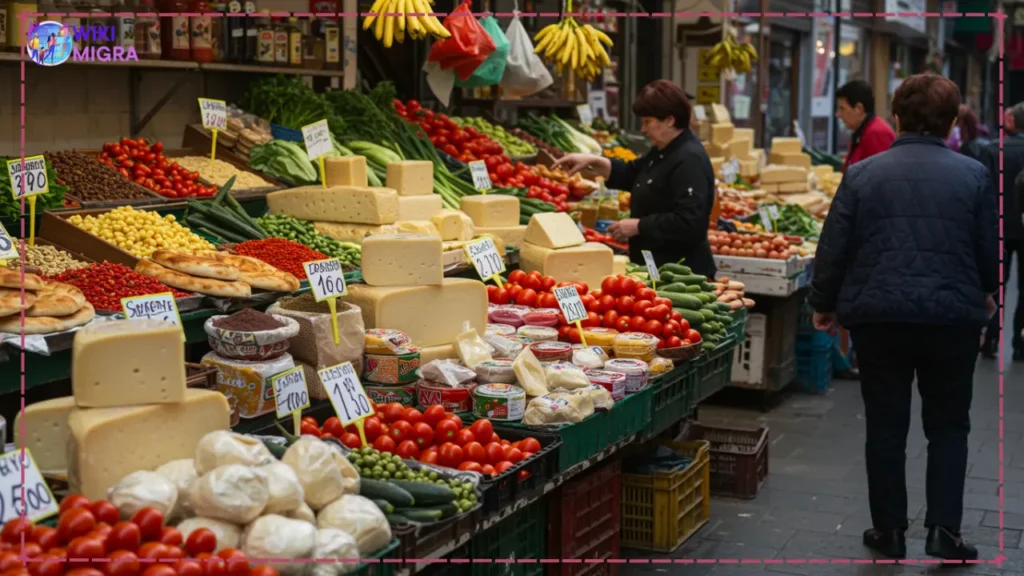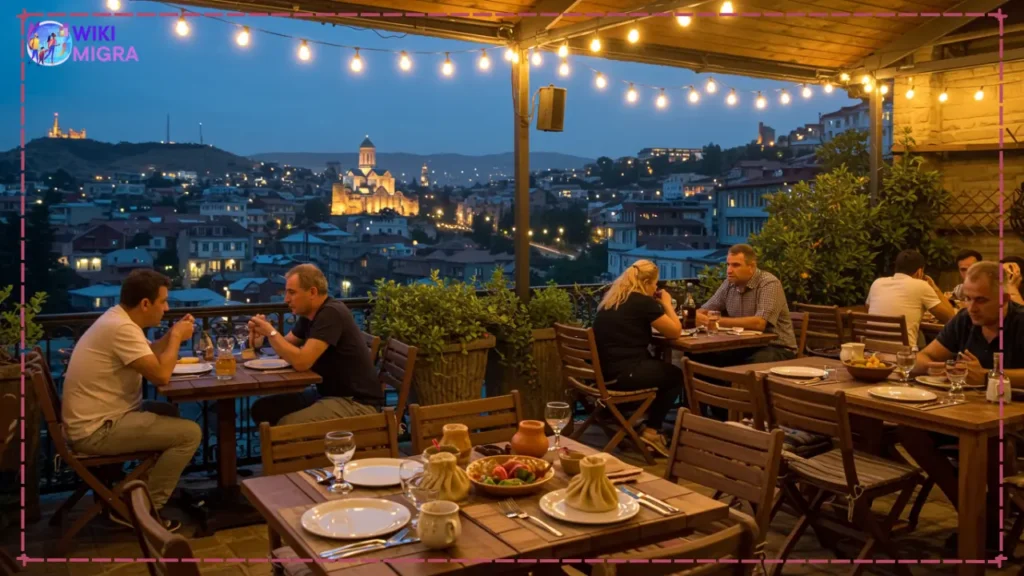The Ultimate Guide to Cost of Living in Georgia [2025]: Prices & Budgeting Tips

Table of Contents
Are you considering a move to Georgia? Understanding the cost of living in Georgia is essential for planning your budget effectively. This comprehensive guide explores everything you need to know about living expenses in Georgia for 2025, from accommodation and food prices to healthcare and entertainment costs.
| Category | Details |
| Average monthly cost (single person) | $650 – $1,200 |
| Average monthly cost (family of four) | $1,800 – $3,500 |
| Most expensive city | Tbilisi |
| Most affordable major city | Kutaisi |
| Currency | Georgian Lari (GEL) – 1 USD ≈ 2.65 GEL |
Georgia has rapidly emerged as one of Eastern Europe’s most attractive destinations for digital nomads, expats, and retirees seeking an affordable yet comfortable lifestyle. Nestled at the crossroads of Europe and Asia, this small country offers a unique blend of ancient culture, stunning landscapes, and remarkably reasonable living costs compared to Western nations.
Whether you’re planning a permanent move, a long-term stay, or simply curious about living expenses in Georgia, this comprehensive guide breaks down exactly what you can expect to spend in 2025. We’ll explore costs across different cities, lifestyle choices, and provide practical budgeting tips to help you make informed decisions about managing the cost of living in Georgia.
➡️ Learn more about: Unlocking Your Future: A Comprehensive Guide to Jobs in Georgia for Foreigners

Overall Cost of Living: Georgia at a Glance
Before diving into specific expenses, let’s contextualize Georgia’s affordability compared to other countries in the region and beyond. Understanding the overall cost of living in Georgia relative to other destinations will help you better appreciate its value proposition.
| Country | Cost Index (Georgia = 100) |
| Georgia | 100 |
| Turkey | 135 |
| Armenia | 110 |
| Ukraine | 95 |
| Poland | 180 |
| Germany | 290 |
| USA | 320 |
Note: This comparative index is approximate and can fluctuate based on economic conditions.
Is Georgia an affordable country to live in?
Yes, Georgia is generally very affordable by European and North American standards. Even in Tbilisi, the capital and most expensive city, your money stretches significantly further than in Western European capitals or major US cities. A comfortable lifestyle that might cost $3,000-$4,000 monthly in parts of Western Europe can be achieved for $1,000-$1,500 in Georgia. This remarkable difference in the cost of living in Georgia makes it an attractive option for remote workers, retirees, and anyone seeking to optimize their budget.
Several factors influence your cost of living in Georgia:
- Location: Tbilisi commands the highest prices, followed by the Black Sea resort city of Batumi. Regional cities like Kutaisi offer significantly lower costs.
- Lifestyle choices: Whether you embrace local products and services or prefer imported goods will dramatically impact your spending.
- Season: Tourist areas like Batumi see price increases during summer months.
- Housing standard: Modern, Western-style apartments cost considerably more than older Soviet-era accommodation.
Detailed Cost Breakdown by Category
To provide a comprehensive picture of the cost of living in Georgia, let’s examine each major expense category in detail. These figures reflect current prices as of May 2025 and apply to the main urban centers of Georgia.
Accommodation Costs in Georgia
Housing will likely be your largest expense when living in Georgia. Prices vary dramatically depending on location, size, condition, and amenities. Accommodation is a major factor in determining your overall cost of living in Georgia, so it’s worth exploring your options carefully.
Renting Apartments
Tbilisi
| Property Type | City Center | Outside Center |
| 1-bedroom apartment | 1,200-1,800 GEL ($450-680) | 700-1,200 GEL ($265-450) |
| 3-bedroom apartment | 2,500-3,500 GEL ($940-1,320) | 1,500-2,200 GEL ($565-830) |
Batumi
| Property Type | City Center | Outside Center |
| 1-bedroom apartment | 1,000-1,600 GEL ($375-600) | 600-1,000 GEL ($225-375) |
| 3-bedroom apartment | 2,000-3,000 GEL ($750-1,130) | 1,300-2,000 GEL ($490-750) |
| Note: Prices in Batumi can increase by 30-50% during peak summer season (June-September) |
Kutaisi
| Property Type | City Center | Outside Center |
| 1-bedroom apartment | 500-800 GEL ($190-300) | 350-600 GEL ($130-225) |
| 3-bedroom apartment | 1,000-1,500 GEL ($375-565) | 700-1,200 GEL ($265-450) |
Utilities Basic utilities (electricity, heating, cooling, water, garbage) average 150-350 GEL ($55-130) monthly for an 85m² apartment, depending on the season. Winter heating costs can be significant, especially in older buildings with poor insulation.
Buying Property
If you’re considering a long-term investment, property prices per square meter are:
- Tbilisi: 2,500-5,000 GEL ($940-1,880) in the center; 1,500-2,500 GEL ($565-940) in suburbs
- Batumi: 2,000-4,000 GEL ($750-1,500) in the center; 1,200-2,200 GEL ($450-830) in suburbs
- Kutaisi: 1,200-2,000 GEL ($450-750) in the center; 800-1,500 GEL ($300-565) in suburbs
Short-term Stays
For those just arriving or exploring different neighborhoods before settling:
- Hostels: 20-40 GEL ($7.50-15) per night
- Budget hotels: 60-120 GEL ($22-45) per night
- Airbnb: 80-200 GEL ($30-75) for basic apartments; 200-500 GEL ($75-190) for premium options
Food & Grocery Prices in Georgia

Georgian cuisine is famously delicious and surprisingly affordable. Here’s what you can expect to pay for food in 2025:
Supermarket Shopping
- Milk (1 liter): 3.50-4.50 GEL ($1.30-1.70)
- White bread (500g): 1.00-1.80 GEL ($0.38-0.68)
- Rice (1kg): 3.00-5.00 GEL ($1.13-1.88)
- Eggs (12): 6.00-9.00 GEL ($2.25-3.40)
- Local cheese (1kg): 12.00-20.00 GEL ($4.50-7.50)
- Chicken breast (1kg): 10.00-15.00 GEL ($3.75-5.65)
- Beef (1kg): 18.00-30.00 GEL ($6.80-11.30)
- Apples (1kg): 2.00-5.00 GEL ($0.75-1.88)
- Bananas (1kg): 3.00-4.50 GEL ($1.13-1.70)
- Tomatoes (1kg): 2.00-7.00 GEL ($0.75-2.65) varies seasonally
- Potatoes (1kg): 1.50-3.00 GEL ($0.56-1.13)
- Local beer (0.5L): 2.00-3.50 GEL ($0.75-1.30)
- Mid-range wine (bottle): 10.00-25.00 GEL ($3.75-9.40)
- Water (1.5L): 0.80-1.50 GEL ($0.30-0.56)
A typical weekly grocery bill for one person buying mostly local products might range from 70-120 GEL ($26-45).
Local Markets
For even better deals and fresher produce, visit local markets (bazaars):
- Prices can be 20-40% lower than supermarkets, especially for fruits and vegetables
- Quality is often superior as products come directly from local farmers
- Popular markets include Deserter’s Bazaar in Tbilisi, Batumi Central Market, and Green Bazaar in Kutaisi
Eating Out
Budget options:
- Khachapuri (cheese bread): 5-10 GEL ($1.90-3.75)
- Khinkali (dumplings): 0.70-1.50 GEL each ($0.26-0.56)
- Fast food meal: 15-25 GEL ($5.65-9.40)
- Local cafe lunch: 15-30 GEL ($5.65-11.30)
Mid-range restaurants:
- Three-course meal for two: 80-150 GEL ($30-56)
- Main dish: 20-40 GEL ($7.50-15)
- Glass of house wine: 5-12 GEL ($1.90-4.50)
- Beer (0.5L): 5-10 GEL ($1.90-3.75)
- Coffee (cappuccino): 4-7 GEL ($1.50-2.65)
High-end dining:
- Three-course meal for two with wine: 150-300 GEL ($56-113)
Transportation Costs in Georgia

Georgia offers extremely affordable public transportation options in urban areas.
Public Transport
Tbilisi:
- Metro/bus single fare: 1 GEL ($0.38)
- Metro card (reloadable): 2 GEL ($0.75) one-time purchase
- Monthly unlimited pass: 45 GEL ($17)
Batumi:
- Bus single fare: 0.80 GEL ($0.30)
- No monthly passes available
Kutaisi:
- Bus/minibus single fare: 0.80 GEL ($0.30)
- No monthly passes available
Taxis and Ride-sharing
Ride-hailing apps are widely available and affordable:
Tbilisi:
- Starting fare: 2-3 GEL ($0.75-1.13)
- Per kilometer: 0.80-1.50 GEL ($0.30-0.56)
- Typical 5km ride: 7-12 GEL ($2.65-4.50)
Batumi:
- Starting fare: 2-3 GEL ($0.75-1.13)
- Per kilometer: 0.80-1.50 GEL ($0.30-0.56)
- Typical 5km ride: 7-12 GEL ($2.65-4.50)
Kutaisi:
- Starting fare: 2-3 GEL ($0.75-1.13)
- Per kilometer: 0.70-1.20 GEL ($0.26-0.45)
- Typical 5km ride: 6-10 GEL ($2.25-3.75)
Popular apps include Bolt, Yandex Go, and Maxim.
Intercity Travel
- Tbilisi to Batumi train: 25-61 GEL ($9.40-23) depending on class
- Tbilisi to Kutaisi minibus (marshrutka): 15-20 GEL ($5.65-7.50)
- Tbilisi to Batumi minibus: 30-40 GEL ($11.30-15)
Owning a Car
- Fuel: 2.70-3.20 GEL per liter ($3.85-4.55 per gallon)
- Car insurance: 300-800 GEL ($113-300) annually depending on vehicle
- Parking: Often free outside city centers; 2-5 GEL ($0.75-1.90) hourly in central areas
Utilities & Bills in Georgia
Basic Utilities
For an 85m² apartment, expect to pay:
- Electricity, heating, cooling, water, garbage: 150-350 GEL ($56-132) monthly
- Winter months can see heating costs double in poorly insulated buildings
Internet & Communications
- High-speed fiber internet (100Mbps+): 50-70 GEL ($19-26) monthly
- Mobile plan with 10-15GB data + calls: 20-35 GEL ($7.50-13) monthly
- SIM card (initial purchase): 3-5 GEL ($1.13-1.90)
Major providers include Magti, Geocell, and Silknet, all offering competitive packages for both internet and mobile services.
Healthcare & Medical Costs in Georgia
Public vs. Private Healthcare
Georgia has a two-tier healthcare system:
- Public healthcare covers basic services but quality and wait times vary
- Private healthcare is affordable by Western standards and generally preferred by expats
Cost of Doctor’s Visits
- General practitioner consultation: 50-100 GEL ($19-38)
- Specialist consultation: 80-150 GEL ($30-56)
- Dentist check-up: 50-100 GEL ($19-38)
- Dental cleaning: 70-120 GEL ($26-45)
- Basic blood test panel: 50-150 GEL ($19-56)
Health Insurance for Expats
Foreign residents typically opt for private health insurance:
- Basic coverage: 80-150 GEL ($30-56) monthly
- Comprehensive coverage: 150-400 GEL ($56-150) monthly
International insurance providers like Cigna and Allianz offer policies, but local options like GPI and Imedi often provide better value.
Leisure, Entertainment & Lifestyle Costs

Fitness & Recreation
- Gym membership: 80-200 GEL ($30-75) monthly
- Yoga class: 20-35 GEL ($7.50-13) per session
- Swimming pool entry: 15-40 GEL ($5.65-15)
- Tennis court rental: 30-60 GEL ($11.30-22.60) per hour
Entertainment
- Cinema ticket: 10-20 GEL ($3.75-7.50)
- Theater/concert tickets: 20-100 GEL ($7.50-38)
- Museum entry: 5-15 GEL ($1.90-5.65)
- Nightclub entry: 0-30 GEL ($0-11.30)
- Beer at a bar: 7-15 GEL ($2.65-5.65)
- Cocktail at a bar: 15-30 GEL ($5.65-11.30)
Shopping
- Jeans (Levi’s or similar): 120-250 GEL ($45-94)
- Summer dress (chain store): 80-150 GEL ($30-56)
- Running shoes (Nike/Adidas): 200-350 GEL ($75-132)
- Men’s haircut: 15-40 GEL ($5.65-15)
- Women’s haircut: 30-100 GEL ($11.30-38)
Electronics are generally 10-20% more expensive than US prices due to import costs.
Education Costs
International Schools
For expat families with children, international school options exist mainly in Tbilisi:
- Annual fees: 15,000-30,000 GEL ($5,650-11,300) per year
- Registration fees: 1,000-5,000 GEL ($375-1,880) one-time
University Tuition for International Students
- Public universities: 2,250-4,500 GEL ($850-1,700) per year
- Private universities: 5,000-15,000 GEL ($1,880-5,650) per year
- Medical programs: 8,000-15,000 GEL ($3,000-5,650) per year
Kindergarten/Preschool
- Local kindergarten: 200-600 GEL ($75-225) monthly
- International kindergarten: 600-1,500 GEL ($225-565) monthly
Miscellaneous Costs
Personal Care
- Toiletries (monthly): 30-80 GEL ($11.30-30)
- Laundry detergent (3L): 15-30 GEL ($5.65-11.30)
- Household cleaning products (monthly): 20-50 GEL ($7.50-19)
Visa/Residency Permit Fees
- Digital Nomad Visa: 300 GEL ($113)
- 1-year residence permit: 210 GEL ($79)
- 5-year residence permit: 440 GEL ($166)
Check the Public Service Hall website for the most current official information.
Banking Fees
- ATM withdrawal (foreign card): 5-15 GEL ($1.90-5.65) + possible foreign exchange fees
- Bank account maintenance: 0-5 GEL ($0-1.90) monthly
- International money transfer: Varies by amount and destination
Cost of Living Comparison: Tbilisi vs. Batumi vs. Kutaisi
When deciding where to settle in Georgia, understanding the cost differences between major cities is crucial. The following table provides a side-by-side comparison of living expenses in Georgia’s three main urban centers, helping you visualize how the cost of living in Georgia varies by location.
| Expense Category | Tbilisi | Batumi | Kutaisi |
| 1-bedroom apartment (city center) | 1,200-1,800 GEL | 1,000-1,600 GEL | 500-800 GEL |
| Monthly utilities | 150-350 GEL | 150-300 GEL | 130-250 GEL |
| Monthly grocery bill (1 person) | 300-500 GEL | 280-450 GEL | 250-400 GEL |
| Restaurant meal (mid-range) | 30-50 GEL | 25-45 GEL | 20-35 GEL |
| Public transport (monthly) | 45 GEL | 50-60 GEL | 40-50 GEL |
| Gym membership | 100-200 GEL | 80-150 GEL | 50-120 GEL |
| Total monthly (approx.) | 1,850-3,350 GEL | 1,600-3,000 GEL | 1,000-2,100 GEL |
| USD equivalent | $700-1,260 | $600-1,130 | $375-790 |
Tbilisi, as the capital, offers the most amenities and international community but at a higher cost. Batumi provides a beach lifestyle with slightly lower prices than Tbilisi, though costs can spike during summer. Kutaisi stands out as notably more affordable while still offering urban conveniences and excellent access to natural attractions.
Sample Monthly Budgets for Different Lifestyles
To give you a clearer picture of the actual cost of living in Georgia based on different lifestyle needs, here are sample monthly budgets broken down by category. These examples can help you estimate your own expected expenses based on your preferences and requirements.
Budget Backpacker/Student: $550-$700 monthly
- Accommodation: Shared apartment or budget studio outside city center: $150-$220
- Food: Mostly cooking at home, occasional street food: $150-$180
- Transportation: Public transport only: $20
- Utilities & Internet: Included or shared: $40-$70
- Healthcare: Basic insurance: $30
- Entertainment: Minimal, free activities: $50-$80
- Miscellaneous: $50-$100
Single Expat (Comfortable): $1,000-$1,500 monthly
- Accommodation: 1-bedroom apartment in decent area: $300-$450
- Food: Mix of home cooking and eating out: $250-$350
- Transportation: Public transport and occasional taxis: $50-$80
- Utilities & Internet: $80-$130
- Healthcare: Good private insurance: $60-$100
- Entertainment & Leisure: $150-$250
- Miscellaneous: $100-$150
Couple (Comfortable): $1,600-$2,200 monthly
- Accommodation: 2-bedroom apartment in good area: $450-$650
- Food: Regular grocery shopping, eating out 2-3 times weekly: $400-$500
- Transportation: Public transport and occasional taxis: $70-$120
- Utilities & Internet: $100-$150
- Healthcare: Comprehensive insurance for two: $120-$200
- Entertainment & Leisure: $250-$350
- Miscellaneous: $150-$250
Family of Four: $2,200-$3,500 monthly
- Accommodation: 3-bedroom apartment in family-friendly area: $650-$900
- Food: Grocery shopping, occasional dining out: $600-$800
- Transportation: Mix of public transport and taxis: $100-$200
- Utilities & Internet: $150-$200
- Healthcare: Family insurance plan: $200-$350
- Education: Local school or homeschooling: $100-$500 (international schools would add significantly)
- Entertainment & Activities: $250-$400
- Miscellaneous: $200-$300
Tips for Saving Money While Living in Georgia
One of the greatest advantages of Georgia is that you can significantly reduce your cost of living without sacrificing quality of life. Here are some practical strategies to optimize your living expenses in Georgia and make your budget stretch even further.
Housing Savings
- Look beyond the center: Prices drop dramatically just 10-15 minutes from central locations
- Negotiate long-term leases: 6+ month commitments often come with significant discounts
- Avoid tourist seasons when apartment hunting in Batumi (June-September)
- Join expat Facebook groups for direct-from-owner rentals avoiding agency fees
Food & Grocery Savings
- Shop at local bazaars: Produce is fresher and significantly cheaper than supermarkets
- Learn seasonal patterns: Fruits and vegetables can be incredibly cheap in season
- Try Georgian staples: Local foods like khachapuri and lobiani are filling and inexpensive
- Cook at home using local ingredients rather than imported products
Transportation Hacks
- Get a transport card in Tbilisi for unlimited rides at a flat monthly fee
- Use apps like Bolt or Yandex instead of street taxis to avoid tourist pricing
- Consider marshrutkas (shared minibuses) for intercity travel instead of trains or taxis
- Walk when possible: Georgian cities are generally quite walkable
Utility Savings
- Be conscious of heating costs in winter; apartments with gas heating are usually cheaper to maintain than electric
- Shop around for internet providers – promo deals for new customers are common
- Use prepaid mobile plans rather than contracts for better rates
Lifestyle Optimization
- Take advantage of free activities: Parks, hiking trails, and many museums have free admission days
- Look for cultural events sponsored by embassies or cultural centers
- Learn basic Georgian phrases to get better prices at markets and avoid tourist markups
- Explore happy hour specials at bars and restaurants, especially in Tbilisi
Is Georgia Expensive? The Verdict
Georgia offers exceptional value for money compared to most European destinations. While not as cheap as some parts of Southeast Asia, your money stretches remarkably far in Georgia – especially if you’re earning in USD, EUR, or other strong currencies.
The key factors that make the cost of living in Georgia affordable include:
- Low housing costs – even in prime locations
- Inexpensive and delicious local food
- Very affordable public transportation
- Reasonable healthcare costs
- Low-cost utilities (though heating can be expensive in winter)
However, your actual cost of living will depend significantly on your lifestyle choices. Those seeking imported goods, frequent dining at international restaurants, or premium housing will see their expenses rise accordingly.
For most foreigners, Georgia represents an opportunity to maintain or even improve their quality of life while spending significantly less than they would in Western countries. A comfortable lifestyle that might cost $3,000+ monthly in Western Europe can be achieved for $1,000-$1,500 in Georgia.
Is it costly to live in Georgia?
Georgia generally offers an affordable cost of living relative to many other U.S. states, though the expense level can vary significantly depending on where you choose to live. In more rural or smaller metropolitan areas such as Statesboro, Augusta, or Macon, the overall expenses for housing, utilities, groceries, and transportation tend to be lower. On the other hand, major metro areas like Atlanta, particularly upscale neighborhoods such as Buckhead or Brookhaven, can carry higher costs—especially in terms of rent and home prices—although even those expenses might be competitive when compared to other large U.S. cities.
Let’s break down the reasoning step by step:
- Housing and Utilities:
Generally, Georgia has a relatively low cost of living in terms of housing. For example, the average home value and median rents are considerably more affordable than many national averages, although homes and rents in urban centers like Atlanta may be higher. Utility costs also remain reasonable in most areas across the state. - Everyday Expenses:
Spending on groceries, transportation, and health care in Georgia tends to align with or be lower than national averages. Certain areas in Georgia even see grocery and other living costs below national figures. This affordability combined with a lower property tax burden makes daily expenses manageable for many residents. - Regional Variability:
While the state averages suggest overall affordability—for instance, Georgia is ranked among the states with the lower cost of living—costs can spike in popular urban centers. For example, Atlanta’s cost of living is estimated to be about 10% higher than the state average, yet it remains below the national average in some categories. Smaller cities and towns, however, maintain lower indices, making them attractive for budget-conscious residents. - Economic Context:
Despite occasional fluctuations driven by local market conditions, Georgia’s overall low tax rates and reasonable living costs (which include affordable housing and utility expenses) contribute to an economically accessible lifestyle. Areas outside major urban centers typically offer residents a high quality of life at a lower cost than many other regions in the United States.
In summary, while living costs in Georgia vary by region, the state overall is known for its affordability, making it a popular destination for those looking for a balanced lifestyle that combines economic practicality with cultural and regional charm.
How much money do you need to live comfortably in Georgia country?
Determining how much money you need to live comfortably in Georgia depends on factors such as your lifestyle, family size, and the city in which you plan to live. However, by comparing data from several authoritative sources, we can build an approximate picture.
Step 1. Assessing Monthly Expenses for a Single Person
- Many cost-of-living models (such as those from PB Services, Expatistan, and Numbeo) show that a single person living in a capital city like Tbilisi may spend roughly USD 600–800 per month on basic food, utilities, transportation, and other essentials—excluding rent.
- If you add rent, keeping in mind that a one-bedroom apartment in central Tbilisi might run around USD 760 (with lower prices found outside the city center), the total monthly budget commonly comes out to be in the range of USD 1,000–1,500. This range provides comfort including occasional dining out, leisure, and a minor buffer for unforeseen expenses.
Step 2. Assessing Monthly Expenses for a Family
- For a family of four, some sources estimate non-rent living expenses (food, utilities, transportation) at about USD 2,200 per month.
- When you add rent (which varies depending on whether you choose a centralized location or a more affordable suburban area), the full monthly budget may realistically range from approximately USD 2,500 to 3,500. This supports a comfortable lifestyle that still leaves room for savings and extras.
Step 3. Considering Variations by Locale and Lifestyle
- Expats and digital nomads in cities like Tbilisi often report that budgeting around USD 1,000 per month is possible for a modest yet comfortable lifestyle, but those who want more upscale or centrally located accommodations might find the budget needs to lean toward the higher end of that range.
- In smaller cities or rural areas, lower rent and living costs might allow comfortable living on less than the Tbilisi figures. However, many newcomers prefer Tbilisi due to its vibrant cultural and business opportunities—even if that means slightly higher expenses.
In conclusion, to live comfortably in Georgia:
- A single person might need an overall monthly budget of roughly USD 1,000–1,500 (including rent, utilities, food, transportation, and personal expenses).
- A family of four might require about USD 2,500–3,500 per month, depending on the exact location and chosen lifestyle.
These estimates combine real-world scenarios presented by multiple sources and reflect the changes in cost-of-living as reported by PB Services, Expatistan, and other industry analyses.
What salary do you need to live comfortably in Georgia?
Based on multiple authoritative sources using the 50/30/20 budget rule and MIT’s Living Wage data, a single full‐time worker in Georgia would need to earn roughly $97,000 a year (about $46.58 per hour) to live comfortably. Meanwhile, for households with two working adults raising two children, the combined annual income required is estimated to be around $212,826.
Let’s break down the logic step by step:
- Two recent studies highlight the cost of living for Georgia. According to a SmartAsset study (also reported by FOX5 Atlanta), a single person in Georgia needs nearly $97,000 per year to cover essential expenses, discretionary spending, and savings under a 50/30/20 rule. This estimate takes into account housing, food, transportation, and other basic needs using MIT’s Living Wage Calculator data adjusted for local costs.
- The same research also shows that for a household with two working adults raising two children, the income required to live comfortably in Georgia rises considerably to about $212,826 annually. This reflects the additional costs of supporting a family in terms of childcare, housing, transportation, and other family-related expenses.
- These figures are drawn from recent studies that combine cost-of-living data and a comfortable lifestyle methodology. Although different sources sometimes use varying definitions (for example, “middle class” might be estimated with lower annual incomes), the “comfortable living” estimates based on a budget that allocates 50% to necessities, 30% to discretionary spending, and 20% to savings or debt repayment consistently point to these figures.
Thus, if you’re looking to live comfortably in Georgia—with “comfortable” defined using the 50/30/20 budgeting approach—your target should be around $97,000 per year as a single earner, or about $212,826 per year for a dual-adult, family-of-four household.
Is Georgia Tbilisi expensive to live in?
Tbilisi is generally considered affordable by Western standards, yet its cost of living can feel expensive for locals and those with modest incomes. Here’s a step‐by‐step breakdown:
- Tbilisi’s overall cost—covering rent, utilities, food, and transportation—is significantly lower than in major Western cities such as New York or London. Extensive data from sources like Expatistan and Numbeo place Tbilisi’s cost index well below cities in North America and Western Europe (for instance, Tbilisi registers around 42 versus New York’s 100).
- Rentals and utilities in Tbilisi remain affordable on the whole. For example, many expats can find studio apartments well below $500 per month, and even mid-range two-bedroom apartments may cost around $1,000 to $1,200 per month. However, influxes of expatriates and an increased demand (especially since the post-2022 migration events) have driven rent up in some popular neighborhoods.
- While expenses like food, drinks, transportation, and utilities remain low, the average salary in Tbilisi is also relatively low (often under $500 per month for locals). This disparity means that although an expat with a Western income might enjoy a high standard of living on a moderate budget (e.g., $1,500 to $2,000 per month), many locals may experience these rising costs as burdensome.
- Additionally, rising rental costs and the overall upward trend in living expenses (partly due to an influx of migrants and digital nomads) present a mixed picture: an affordable city for many international residents but one where certain costs—most notably housing—are stretching local budgets.
In summary, Tbilisi is not “expensive” compared to major Western cities; rather, it offers a very competitive cost-of-living for expats. However, for local residents earning considerably less, and with the increasing rents driven by external demand, living in Tbilisi can feel relatively expensive.
Frequently Asked Questions about Cost of Living in Georgia
Q: How much money do I need to live comfortably in Georgia?
A single person can live comfortably on $1,000-$1,500 per month in Tbilisi, and even less in smaller cities. This budget allows for a nice apartment, regular dining out, and entertainment. Families should budget $2,000-$3,500 depending on lifestyle and educational choices.
Q: Is Tbilisi more expensive than Batumi?
Tbilisi is generally more expensive for accommodation year-round, but Batumi prices can exceed Tbilisi’s during the summer tourist season (June-September). Overall, Tbilisi has higher costs for entertainment and international products, while Batumi has comparable or slightly lower everyday expenses.
Q: What is the average rent in Georgia?
The average rent for a one-bedroom apartment in central Tbilisi is approximately $450-$650, in Batumi $375-$600, and in Kutaisi $190-$300. Outside city centers, prices decrease by 30-50%.
Q: Can you live on $1000 a month in Georgia?
Yes, $1000 per month allows for a modest but comfortable lifestyle for a single person in Georgia. This budget covers a decent apartment (especially outside the city center), groceries, transportation, utilities, healthcare, and some entertainment.
Q: What is the cheapest city to live in Georgia?
Among major cities, Kutaisi is significantly cheaper than both Tbilisi and Batumi, with housing costs about 50% lower than the capital. Smaller cities like Rustavi, Zugdidi, and Gori offer even lower costs but fewer amenities and smaller expat communities.
Q: Do I need to speak Georgian to live affordably in Georgia?
While not absolutely necessary, knowing basic Georgian phrases can help you negotiate better prices at markets and with local services. In Tbilisi and Batumi, English is widely spoken in restaurants, hotels, and among younger Georgians. Russian is also commonly understood, especially among the older generation.
Q: How does the cost of living in Georgia compare to Eastern European countries?
The cost of living in Georgia is generally lower than most Eastern European EU member states like Poland, Hungary, or the Baltic states. It’s roughly comparable to Ukraine and slightly more expensive than some parts of the Balkans. Georgia offers particularly good value in housing and food categories.
Conclusion
Georgia offers an exceptional value proposition for those seeking an affordable European lifestyle without compromising on quality of life. Whether you’re a digital nomad looking for a temporary base, a retiree stretching your pension, or an expatriate seeking new opportunities, Georgia’s combination of low living costs, beautiful surroundings, rich culture, and hospitable locals makes it worthy of serious consideration.
While this guide provides comprehensive information on the cost of living in Georgia across various cities, prices can fluctuate with seasonal demands, economic conditions, and exchange rate variations. We recommend visiting for a short stay before making long-term commitments to ensure the lifestyle meets your expectations.
When planning your budget, remember that the cost of living in Georgia can be tailored to your preferences – you can live quite modestly or quite luxuriously, with significant price differences between these options. Most expats find they can maintain a higher standard of living in Georgia than they could afford in their home countries.
Have you lived in Georgia or are you planning to move there? Share your experiences or questions about the cost of living in Georgia in the comments below!
Disclaimer: All prices in this article are approximate and based on data collected in May 2025. Your actual costs may vary depending on lifestyle choices, location preferences, and economic changes.





